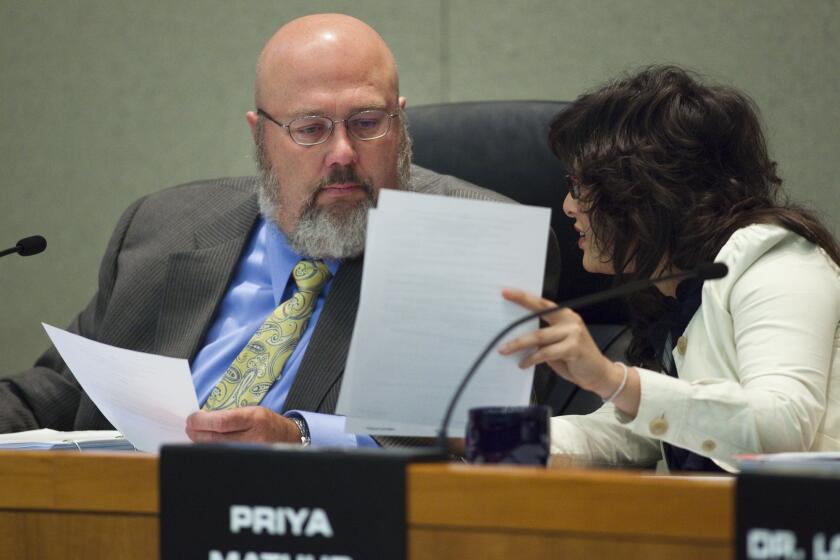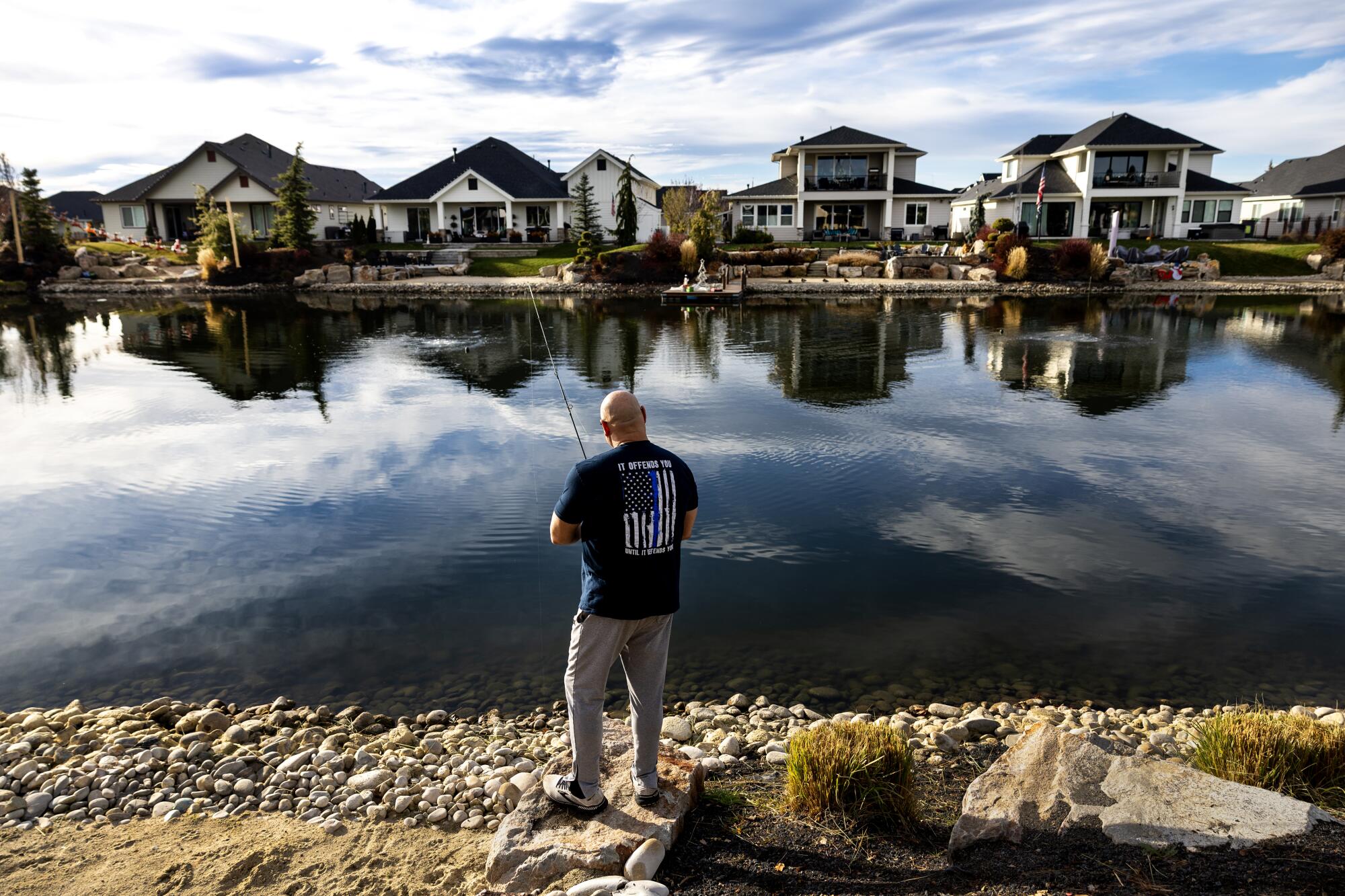
EAGLE, Idaho — The recent mayoral election in this sleepy, conservative town nestled in the foothills outside Boise didn’t hinge on which Republican candidate was a fiercer supporter of former President Trump, or who was a stronger opponent of abortion. The key issue? Who was the least Californian.
Both staunchly conservative candidates were refugees from the Golden State. The incumbent had arrived in 2003 from Orange County with little more than the shirt on his back. His challenger, a retired Santa Clara County fire captain, came about a decade later with a six-figure pension courtesy of California taxpayers.
That made him, and the hundreds of other retired California cops and firefighters flooding into the town in recent years, seem practically socialist to the old guard who find it hard to trust new arrivals with pockets full of government cash.
“It’s ludicrous” that they call themselves Republicans, Mayor Jason Pierce said during an interview on election day in early December. “You find a lot of Californians who move here don’t realize how much [liberal] baggage they’re bringing with them.”

And that’s the irony: Whether locals like it or not, California public pension money is the lifeblood of the economy in this small-government, Republican boomtown.
It’s a phenomenon happening across the West, as tens of thousands of California’s career civil servants — people who devoted their working lives to making state and local government function — decide California is no longer their home.
Nearly 90,000 members of CalPERS, California’s main public employee retirement system, received their payments outside the state, according to a Times analysis of 2022 data, the most recent year available. Those Golden State exiles collected more than $3.6 billion in state pensions.
And that’s only CalPERS members. The totals don’t include retirees from local governments that have their own pension plans, including Los Angeles County and the city of Los Angeles.
Almost all the top out-of-state destinations in the CalPERS data are low-tax havens: the Nevada shore of Lake Tahoe, the desert suburbs of Reno, and Lake Havasu, Ariz.
But no ZIP Code outside the state received more CalPERS money than 83616 in Eagle, a suburb with about 30,000 people hundreds of miles from California.

New arrivals roll in beneath a road-spanning arch with a giant rendering of a bald eagle. California expats are easy to find.
With the stroke of a pen, California Gov.
In early December, the street was lined with campaign signs touting Pierce and his challenger, Brad Pike.
Pierce arrived in 2003 from Yorba Linda with a wife, two young kids and no job. He was so determined to raise his children somewhere that aligned with his values he was willing to restart his IT career from scratch.
As mayor, Pierce said he is routinely contacted by more recently arrived Californians who see garbage on the streets and, instead of picking it up themselves, ask him why the town doesn’t hire more maintenance workers. “So, you want your taxes to go up,” he said he asks them. “You want more government?”
He finds it particularly hard to understand how retired police and firefighters, who often collect more from their California pensions than their local counterparts earn in salary, can consider themselves conservatives.
“They want to give the same kind of benefits to officers and state employees here,” Pierce said. “And, it’s like, wait a minute, you literally created a huge deficit in California and now you want to do the same thing here?”
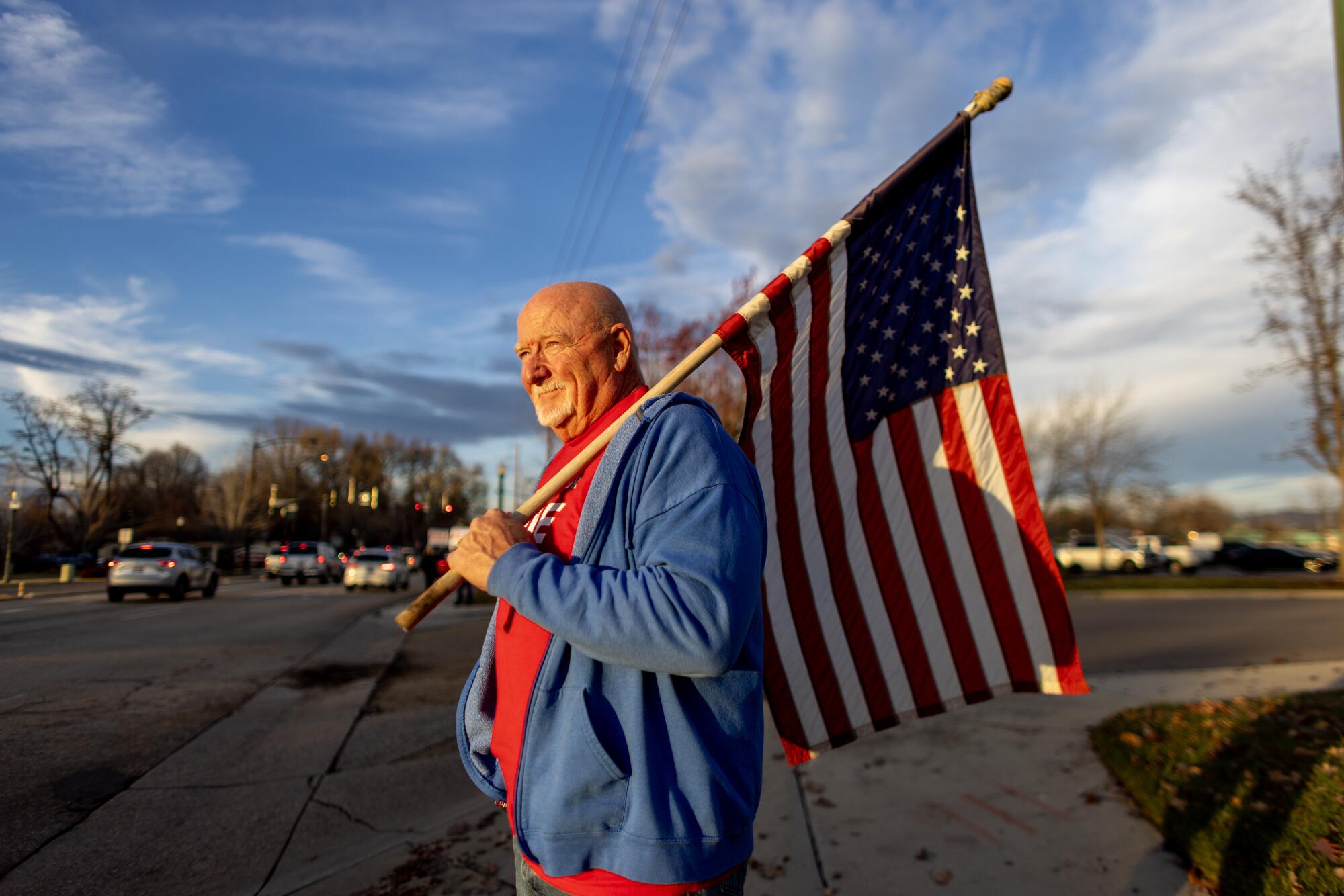
His challenger, Pike, said he felt whiplash moving from one state where people accused him of being too conservative to another where he’s suspected of not being conservative enough.
He’s been a Republican for 41 years, he said, and left California in part because of the arrogance and entitlement he felt from Democratic Gov. Gavin Newsom and his predecessor, Jerry Brown, who ran the state with no meaningful opposition and almost no regard for the feelings of Californians like him.
When he arrived in Idaho, he felt as though he was finally able to “exhale,” he said, to “relax and enjoy life.”
So it was a shock when the mayor’s supporters attacked him from the other flank, accusing him of being a RINO (Republican in name only) and a Democratic “plant.”
“I came here looking for anything that’s not the liberal, socialistic view of the government in California,” Pike said.
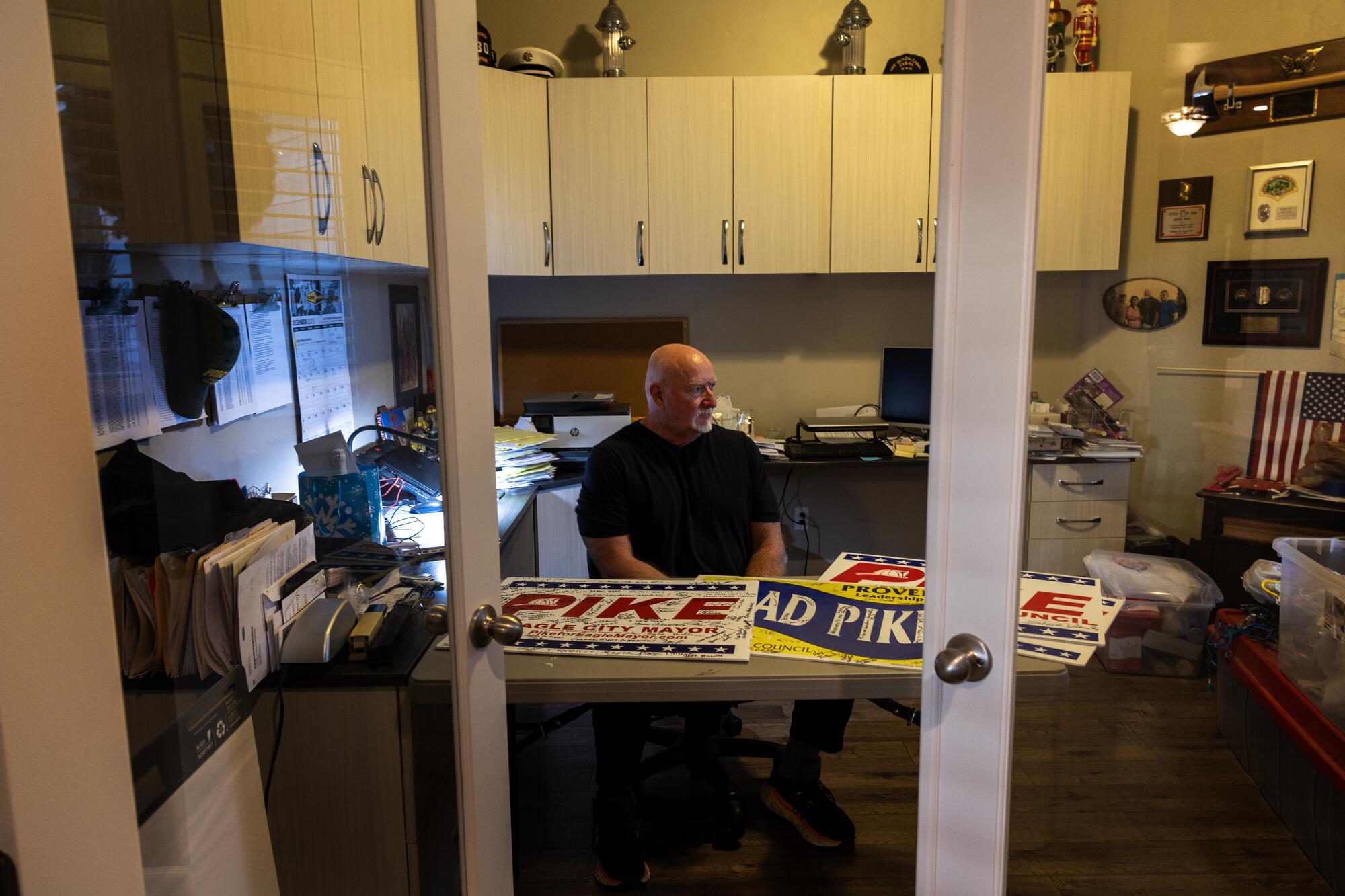
Asked if he thought it was hypocritical to complain about socialism in a state that provides him a $123,000-a-year pension, Pike said he figured anybody who raised such questions was just jealous.
“This is a free country, you have the option to go anywhere you want,” Pike said. “I’m not ashamed to say that I brought my CalPERS pension to Idaho.”
A pension is a guaranteed payment for life after retirement. Decades ago, they were a standard benefit of career-level corporate and government jobs in America. But they’re almost unheard of in the private sector now.
Instead, companies offer retirement savings plans like 401(k)s, which the employee can invest in, tax-free, with the hope that it will grow into a tidy nest egg. But regardless of what happens with those investments, once the employee retires, the company is off the hook.
In 2000, as pensions were rapidly disappearing elsewhere, California Gov. Gray Davis signed legislation giving state employees one of the most sweeping and generous pension plans ever created.

Subscribers get exclusive access to this story
We’re offering L.A. Times subscribers special access to our best journalism. Thank you for your support.
Explore more Subscriber Exclusive content.
It granted more than 200,000 civil servants the ability to retire at 55 and, in many cases, collect more than half of their highest salary for the rest of their lives. California Highway Patrol officers did even better: They could retire at 50 and receive as much as 90% of their peak pay as long as they lived.
County and local governments in California that were not part of the state’s plan quickly adopted similar policies so that their best employees wouldn’t jump to state jobs.
Supporters of the measure — mostly public employee unions — sold it with the promise that it would impose no new costs on California taxpayers. To finance it, the state employees’ pension fund would make wise investments and the money would grow fast enough to pay the bill in full.
That’s not what happened. Successive market downturns — including the dot.com bubble burst and the housing collapse of 2008 — made a hash of those rosy predictions and state and local governments have spent years shoveling billions of taxpayer dollars into their plans to make up for the losses and keep them afloat.
In 2016, Davis admitted signing the measure had been a mistake, but little has changed. That means, every year, thousands of Californians in their 50s walk away from government jobs with plenty of time and money on their hands. Many of them are looking for greener pastures.

Jorge Grajeda retired from the Long Beach Police Department in September. He was born in Mexico and moved to Southern California with his family when he was 5. He was living the American dream in his early years as a cop, but as his responsibilities grew, he couldn’t help noticing the bite taxes took from his paychecks.
“I was paying some years $40,000 in income tax,” Grajeda said, and getting what felt to him like very little in return.
“I didn’t get subsidized housing, I didn’t get lower utility bills” that the government offered lower income people. “Nobody looked out for me,” Grajeda said.
And the sense of pride and accomplishment he felt in being a police officer eroded quickly, around the time of the national reckoning on police brutality that followed the 2014 shooting of Michael Brown, an unarmed Black teenager, by a white police officer in Ferguson, Mo.
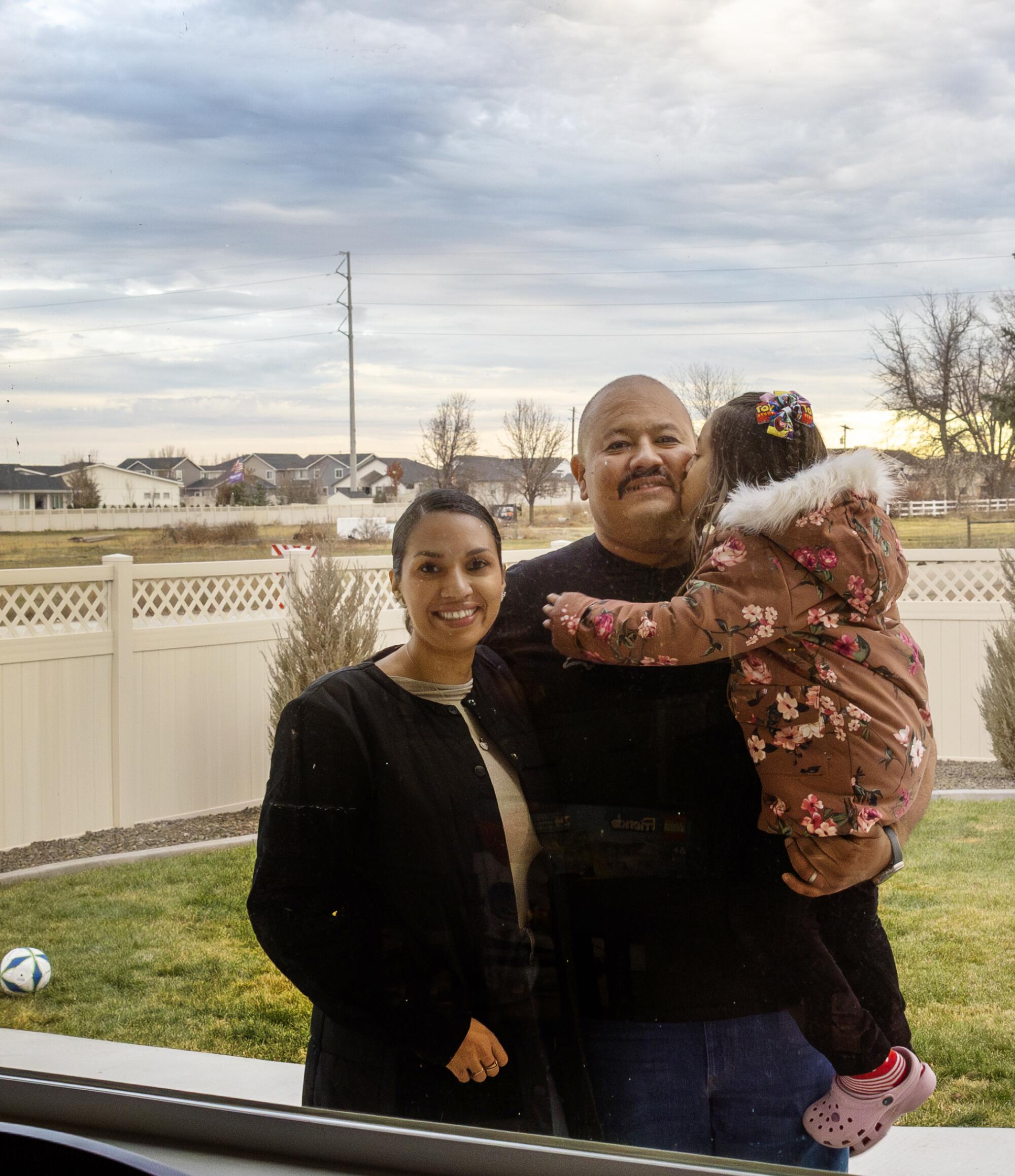
“We used to go places and people would wave to us,” but in the last 10 years, “pretty much all of that went away,” Grajeda said. Now, he said, “it’s all about race.”
Every time you stop somebody, or pull them over in their car, they call you “a racist,” Grajeda said. “It shouldn’t be like that. It should be about right and wrong. If you do the wrong thing, there are consequences.”
Recruitment at police departments suffered as a result of the changing political climate, forcing cops already on the job to work extensive overtime, Grajeda said. The money was great, but the endless hours were wearing him down. That’s when a sergeant he was working patrol with mentioned, almost in passing, a small town in Idaho called Eagle. It sounded as if life would be simpler there, Grajeda thought.
Today, Grajeda owns four houses in the Treasure Valley, as the area surrounding Eagle is known. He lives in one with his family and rents out the other three. He had never imagined owning so much real estate, but the prices and interest rates were so low in Idaho before the pandemic, when he started looking, he couldn’t pass up the investment opportunity, he said.
“I was feeling so burned down, frustrated, stressed” as a police officer in Long Beach, Grajeda said. When he visited Idaho, he was struck by how safe he felt. “That’s how it used to be when I was a little kid,” he added.
A retired sergeant from the Los Angeles County Sheriff’s Department, who asked that his name not be published because of credible threats from an ex-inmate he helped arrest, arrived in 2019 with his $128,000 pension and guaranteed health coverage.
Does he feel any remorse for leaving California, the source of his retirement income?
“You get over that real quick,” he said, laughing at the question. “You put 30 years of blood, sweat and tears into the city. You don’t feel guilty at all.”
He lived in Southern California his whole life and used to love it, he said. But he too had grown to view the state as a toxic stew of crime, homelessness and liberal policies that made police work seem thankless.
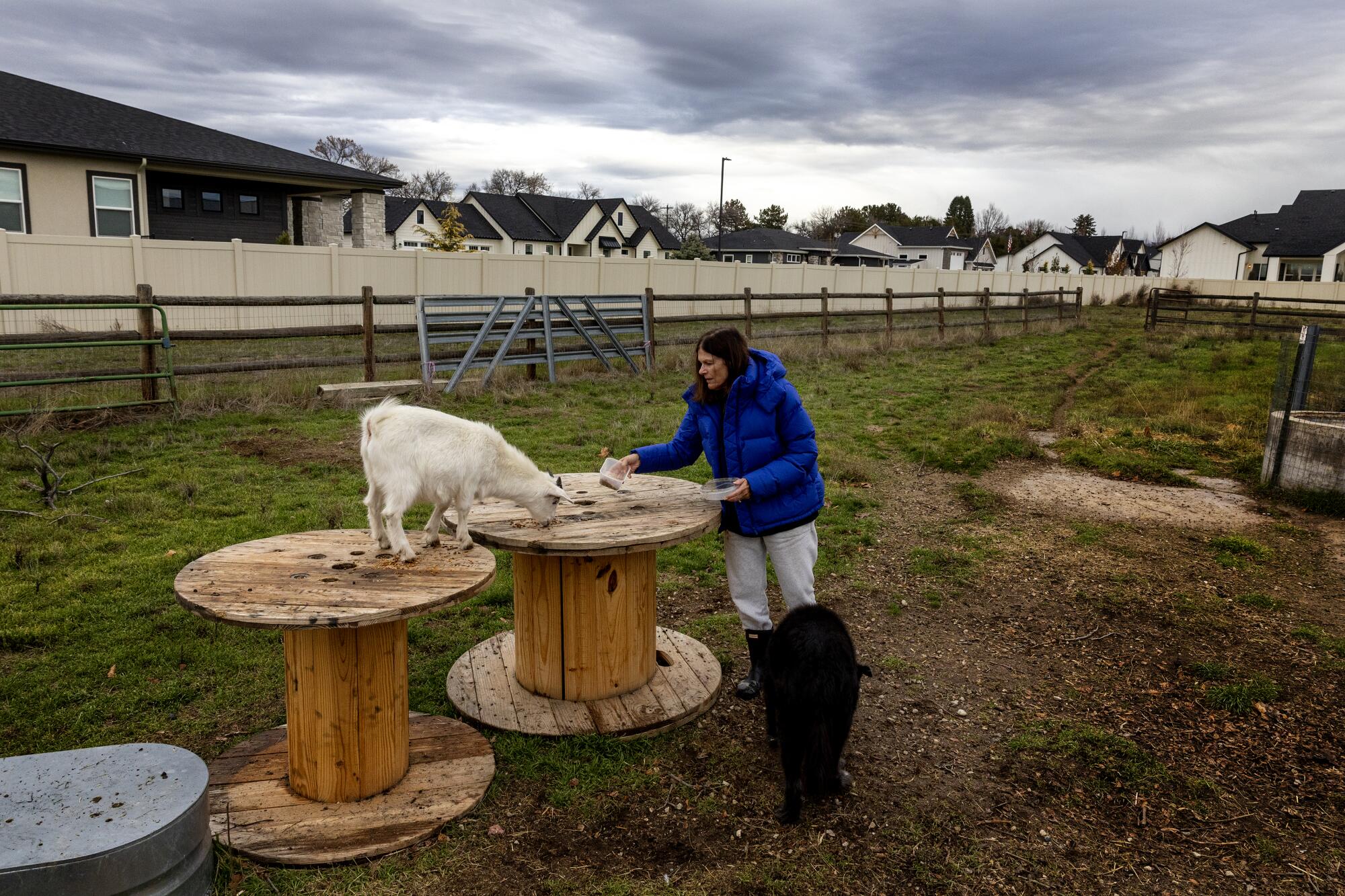
The day he turned in his badge and gun he snapped a photo of the department’s Monterey Park headquarters in his side-view mirror as he pulled away. He sent it to friends still on the job, wished them luck and drove straight north, not even stopping for gas until he crossed the California border, he said.
He has two grown daughters who live in Southern Idaho now too. One is a real estate agent, the other is a hairstylist, and while neither could hope to afford a house when they lived in California, he said, they own four between them in Idaho.
For those who believe that California is in danger of breaking its promise of retirement cash for local and state government workers, this week marks another important milestone in taking stock of the effort to change course.
“They’re killing it,” he said, sounding every bit the proud father. “It’s like a dream.”
His daughter has sold about 20 houses to colleagues from the LASD, he said. Most of them are retired, but some are still working and have arranged their schedules so they can make the commute.
He lives in a master-planned community called Legacy with enormous gates, wide boulevards and its own three-hole golf course. It’s known locally as “Little Orange County,” and it looks like a slice of Irvine plunked in the middle of rolling prairie.
As he stood in the sand on the beach in his backyard, casting his fishing line into a man-made lake, he pointed to the other houses around the water, listing off the departments their owners worked for: Santa Monica PD, LAPD, California Highway Patrol. Nine of the 11 houses within sight were occupied by former California cops.
They’re about 90% Republicans, he said. His own, spotless garage is adorned with enormous, red, white and blue banners reading, “Let’s Go Brandon” and “Trump 2024 Take America Back.”

Like many cops, he said his disillusionment with California’s government stems from the sense that police department leaders and politicians no longer have their backs.
Cops not only have to worry about the most violent and unstable members of society they’re asked to confront on the street, he said, they also have to worry about prosecutors trying to score points with liberal voters by “hanging them out to dry” when things go wrong.
It takes a toll. “I’ve stood on the front lines at protests with people spitting in your face, throwing bottles and rocks, and you couldn’t do anything,” he said. “That was just silly to me.”
If people in California are upset that so much pension money is fleeing the state, it’s their fault for electing politicians who don’t support the police, he said, adding, “If those guys weren’t in office, I tell you right now, 70% to 80% of us would still be in California.”
For the record:
12:09 p.m. Dec. 26, 2023An earlier version of this article referred to Brad Pike as a retired Santa Clara fire chief. He was a captain with the Santa Clara County Fire Department.
It’s a sentiment widely shared by the California exiles, whose takeover of Eagle now appears to be complete. Their preferred candidate, the former Santa Clara County fire captain who was accused of being too Californian, won the runoff election by a landslide.
More to Read
Subscriber Exclusive Alert
If you're an L.A. Times subscriber, you can sign up to get alerts about early or entirely exclusive content.
You may occasionally receive promotional content from the Los Angeles Times.
